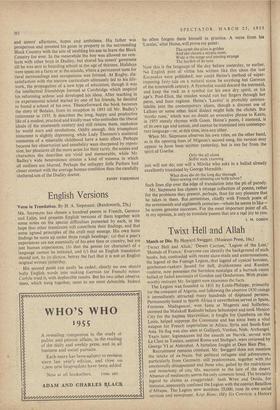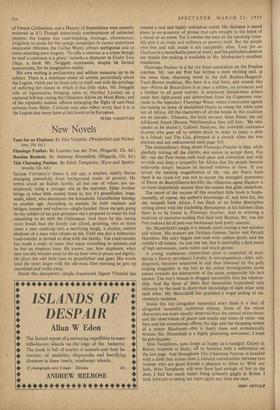Twixt Hell and Allah
March or Die. By Howard Swiggett. (Museum Press, 16s.) 'Twix-r Hell and Allah,' Desert Carrion,' Legion of the Lost,' 'Hounds of France.' Everyone can identify the background of such books, but, contrasted with recent slave-trails and exterminations, the legend of the Foreign Legion, that legend of cynical heroism, gentleman-rankers bound for hell, drunkenness and Russian roulette, now possesses the harmless nostalgia of a barrack-room ballad or faded souvenirs of Gordon and Omdurman. With praise- worthy restraint Mr. Swiggett now examines the facts.
The Legion was founded in 1831 by ,Louis-Philippe, primarily for the conquest of Algeria, and following the abortive 1830 risings it immediately attracted many hundreds of displaced persons. Permanently based in North Africa it nevertheless served in Spain, Formosa Madagascar, won fame at Magenta and Solferino, stormed the Malakoff Redoubt before Sebastopol and took Mexico City for the hapless Maximilian; it fought for Gambetta on the Loire, helped suppress the Commune and has since been a vital weapon for French imperialism in Africa. Syria and South-East Asia. Its flag .was also seen at Gallipoli, Verdun, Nish, Archangel. Years later, legionnaires led the assault on Narvik, served with Le Clerc in Tunisia, entered Rome and Stuttgart, were reviewed by George VI at Aldershot. A battalion fought at Dien Bien Phu.
Recruitment remains constant. Mr. Swiggett does not mention the intake of ex-Nazis. but political refugees and adventurers, particularly from Germany. still predominate, together with the emotionally disappointed and those who, galled by the restrictions and monotony of city life, succumb to the lure of the desert. Absence of mediocrity seems the only common bond. The brutality legend he claims as exaggerated : both Wren and Ouida, for instance, apparently confused the Legion with the convict Bataillon d'Afrique. The Legion now numbers 35,000, runs its own social services and newspaper, Kepi Blanc. (My Six Convicts, a History of French Civilisation, and a History of Superstition were recently reviewed in it!) Though notoriously contemptuous of subjected peoples, the Legion has road-building, drainage, afforestation, irrigation to atone for the savage campaigns in causes sometimes despicable (Mexico, the Carlist Wars), always ambiguous and at times attaining pure tragedy. 'To rifle a caravan is a crime though to steal a continent is a glory,' remarks a character in Under Two Flags, a book Mr. Swiggett commends, despite its factual inaccuracies, for its imaginative reality.
His own writing is perfunctory and seldom measures up to its subject. There is a mystique about all armies, particularly about the Legion, which can be loyal only to itself and with the privilege of suffering for causes in which it has little stake. Mr. Swiggett tells of legionnaires bringing roses to Marshal Lyautey on a captured hill-top, racing the Chasseurs Alpins up Mont Blanc, and • of the reputedly sadistic officers arranging the flight of anti-Nazi privates from Hitler. Civilians may also reflect wryly that it is in the Legion that many have at last learnt to be European.



































 Previous page
Previous page